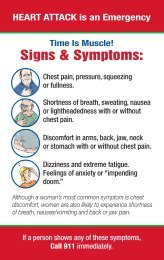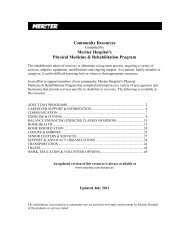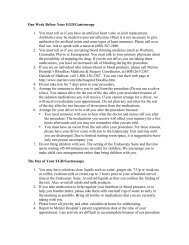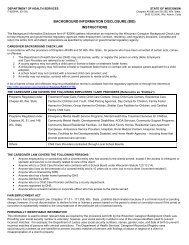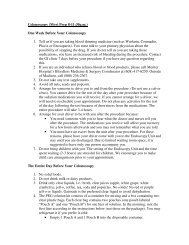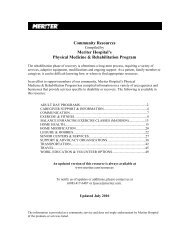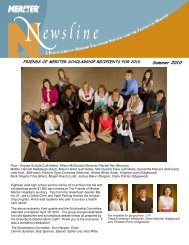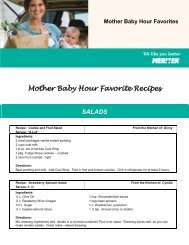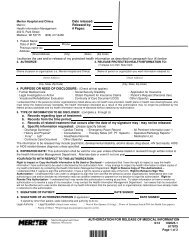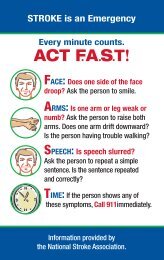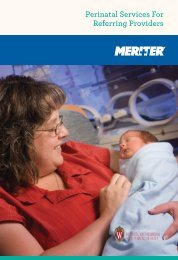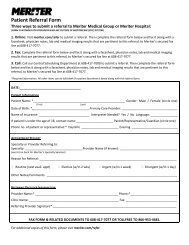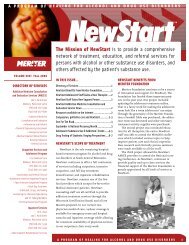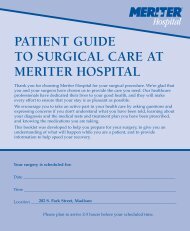A Guide To Your New Family's First Weeks - Meriter Health Services
A Guide To Your New Family's First Weeks - Meriter Health Services
A Guide To Your New Family's First Weeks - Meriter Health Services
You also want an ePaper? Increase the reach of your titles
YUMPU automatically turns print PDFs into web optimized ePapers that Google loves.
Nutrition and Feeding: Formula Feeding<br />
If you have decided that formula is the choice for you and your baby remember—love that you give during feeding does<br />
not come from the milk. Holding, cuddling and the time you spend with your baby nurtures your baby, along with the<br />
milk you provide.<br />
For non-breastfeeding infants, the American Academy of Pediatrics recommends iron-fortified infant formula for the<br />
first year. There are a variety of infant formulas to choose from. Most formulas are made from cow’s milk; however,<br />
soy-based formulas are available for infants with milk allergies or sensitivities. Homogenized cow’s milk is not safe for<br />
infants in their first year. If there is a family history of milk allergies, please tell your baby’s doctor. You and<br />
your baby’s doctor can choose the brand and type of formula that is best for your baby.<br />
Types of Formula<br />
Formula is available in three forms. Preparation time<br />
and cost may be factors in your decision on which<br />
form to use.<br />
1. Ready to Feed<br />
• Most expensive<br />
• Easiest to prepare<br />
• Needs no refrigeration until opened<br />
• Convenient when traveling or uncertain of<br />
water supply<br />
2. Concentrated<br />
• Must be mixed before feeding<br />
• Requires safe water source<br />
• Mix according to directions<br />
• Can be stored open in refrigerator for up to 24<br />
hours if not diluted<br />
• Needs to be used within 24 hours once diluted<br />
• Discard within 1-2 hours after preparation if<br />
not refrigerated<br />
3. Powder<br />
• Mix according to directions on can<br />
• Requires a safe water source<br />
• Needs no refrigeration until mixed, then it is<br />
stable refrigerated for 24 hours<br />
• Least expensive<br />
Preparing Formula<br />
It is important to mix the formula according to the<br />
manufacturer’s directions. In the hospital, you will<br />
be using ready-to-feed formula, which requires no<br />
special preparation. You should discard each bottle<br />
within one hour of beginning the feeding. Do not<br />
reuse bottles for feedings. Always wash your hands<br />
before preparing formula and beginning a feeding.<br />
No warming is necessary; babies can take cold<br />
formula. If your baby prefers it warm, place the<br />
bottle of formula in a container of warmed water.<br />
NEVER MICROWAVE THE FORMULA.<br />
Water Supply<br />
Preparing formula with a safe and appropriate<br />
water supply is important for your baby’s health.<br />
When choosing the water source for infant formula<br />
preparation, levels of nitrates, bacteria, copper, lead<br />
and fluoride should be considered. Parents should<br />
consult their baby’s provider on the most appropriate<br />
water source for formula preparation.<br />
Tap Water<br />
• Do not use softened water for formula<br />
preparation, because it contains salt.<br />
• Use only fresh water directly from the cold-water<br />
tap.<br />
• Let water run for about a minute before using.<br />
• You do not need to boil city water unless a water<br />
advisory is in effect.<br />
Well Water<br />
• If you have well water, you should have it checked<br />
for bacteria, nitrates, minerals and fluoride.<br />
• You should not use water with elevated nitrate<br />
levels for infants under 6 months of age.<br />
• Bacteria in water can cause vomiting and diarrhea.<br />
Boiling water will kill bacteria but increase nitrate<br />
levels.<br />
• Speak with your doctor about the need to provide<br />
your baby with a fluoride supplement.<br />
Water Testing: Recommendations for Testing<br />
• If your home is less than 6 months old, have your<br />
water tested for copper.<br />
33



